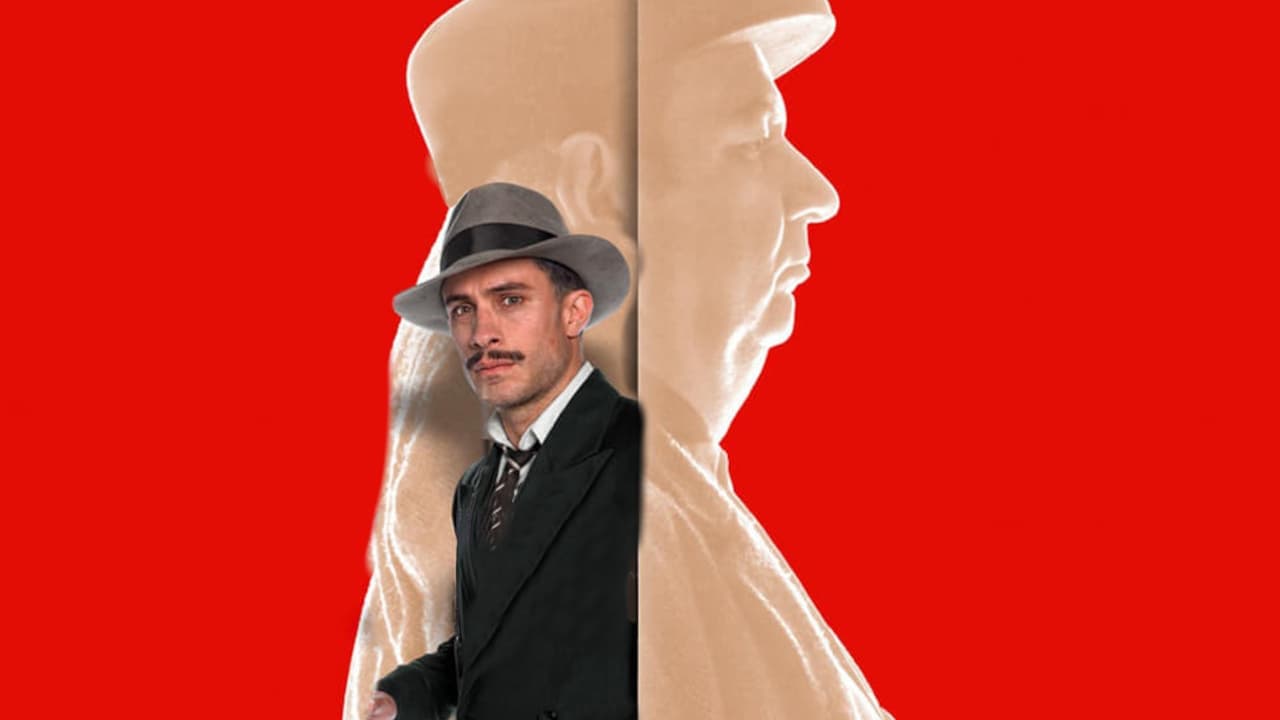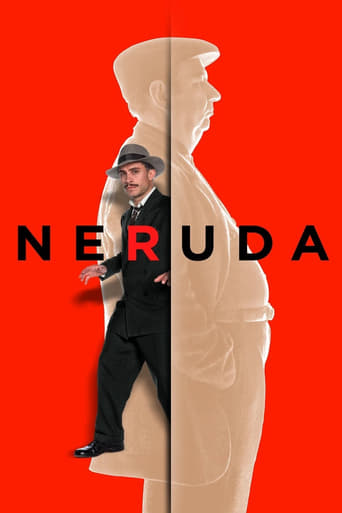



Although it has its amusing moments, in eneral the plot does not convince.
View MoreLet me be very fair here, this is not the best movie in my opinion. But, this movie is fun, it has purpose and is very enjoyable to watch.
View MoreJust intense enough to provide a much-needed diversion, just lightweight enough to make you forget about it soon after it’s over. It’s not exactly “good,” per se, but it does what it sets out to do in terms of putting us on edge, which makes it … successful?
View MoreIt really made me laugh, but for some moments I was tearing up because I could relate so much.
View MorePart fact / part fiction: based on the life of renowned Chilean poet Pablo Neruda, the film takes place in the 1940s when Neruda (played by Luis Gnecco) is a communist senator being hunted by a detective (Gael Garcia Bernal) as communism has just become illegal.Director Pablo Narrain approaches his film with techniques that are very much like that of a poem - very appropriate considering the title character is a poet. Such techniques include dark rooms that are lit only with sunbeams streaking through windows, outdoor shots where the camera faces the sun which makes the actors into silhouettes, film-noir music, carefully crafted camera movements, voice-over narration by the main characters - all in very brief scenes.With the deliberate choice of style over substance (though there is much substance), "Neruda" comes off as more a director's film than one that highlights story and performances. This limited scope ends up having a limited result for a film that might have been more. But if the choice was to turn film into poetry, Narrain must be given credit for a successful venture.
View MoreIn post war Chile, Communist poet Senator Pablo Neruda (Luis Gnecco) enrages the political establishment. He decides to go into hiding as Óscar Peluchonneau (Gael García Bernal) leads a large police dragnet to arrest him. Soon, anti-communist repression takes hold in the country and many are imprisoned.This has too much of an artistic flair. I get the connection with a poet protagonist. I would like to understand the political climate at the beginning. Neruda talks about strikes. It would be helpful to see more of the anti-union brutality. It would set the stage for his initial escape. Not everybody knows the history or even who Augusto Pinochet is. I like the Captain Ahab aspect of Peluchonneau. It would be good to have less artistic flair. I want less literary exposition and more intense thrills. I like the turn as the political roundups take its toll and the darker character descend. There is a more intense take on this story but I'm not completely opposed to this artistic rendering.
View MoreGreetings again from the darkness. There is little offered by the history of the country of Chile that would lead you to believe that some laughs, giggles and chuckles are in store if you watch director Pablo Larrain's film about Pablo Neruda. But that's exactly what happens as we watch a police inspector hunt down the Nobel Prize winning Chilean poet and Senator. While you would probably not describe it as an outright comedy, it's a serio-comedy that will educate (a little) and entertain (a lot).The opening scene takes place in the men's room as a most serious Senate debate has flowed into an inappropriate locale. Apparently there is no relief during this time of relieving. It's here that Neruda's spoken words are as important as those he writes, and those spoken words lead directly to his need to go on the run. The poet/senator and his artist wife Delia del Carril become fugitives in their own country, and most of the film has them negotiating the Chilean underground. Set in 1948, three years after the end of WWII, a fascinating game of cat and mouse between hunter and hunted evolves. Director Larrain and writer Guillermo Calderon employ a generously creative license, and play quite fast and loose with facts resulting in a delightfully complex quasi-detective story. Luis Gnecco plays Pablo Neruda, and actually looks very much like the Chilean icon who was influential, but also a bit prickly and burdened with his own sense of entitlement. Gael Garcia Bernal plays Inspector Peluchonneau, who is charged by the President to hunt down and capture the now enemy of the state. It's a wild chase that involves up to 300 policemen in support of the Inspector who romanticizes the chase. The filmmakers have more fun with traditional story structure as the Inspector's internal dialogue questions whether he is the lead character an idea that would never be considered by the man he is chasing.The film has a retro look and feel, and borders on farcical at times – the shots inside a moving car appear right out of the old 1940's detective movies. But the harsh realities of the times are never far removed. It could be a Picasso speech or a concentration camp director named Pinochet (soon to play a more important role in Chile). Neither the Inspector nor the fugitive make for a trustworthy narrator, but their different perspectives constantly provide us with more bits to consider.Luis Gnecco, Gael Garcia Bernal and Mercedes Moran (as Delia del Carril) are all excellent in their roles, and the use of music is spot on especially the score from Federico Justid (whose work I noted in Magallanes and The Secret in Their Eyes). Director Larrain also released the high profile Jackie (with Natalie Portman) over the holidays, and deserves to be discussed as one of the more creative filmmakers working today. It's pretty tough to name another contemporary film that blends an oddball inspector, a tough woman losing touch, and a narcissistic fugitive – all with bases in reality, while never settling for something as mundane as the truth.
View MoreThis is a fictional plot around the very real character of Pablo Neruda, the Chilean poet who, during the 1940's, had also been a senator in the Chilean congress on behalf of the communist party. The film is set in 1948, when the authorities crack down on communists - a time that may be viewed as a chilling precursor to 1970's Pinochet - and the basic plot is about Neruda's escapes from the police, endeavors that force him all over Chile. Luis Gnecco as Neruda is fantastic and so is Mercedes Morán as Delia, Neruda's aristocratic wife. At one level, the film offer a troubling inquiry into the personality of this esteemed poet-intellectual-communist. He is an admired spokesperson for the workers and the downtrodden but he is also a hedonistic drunk and a spoiled womanizer; rough and gentle, strong and weak, Neruda's character and image keeps shifting, and it is to the credit of this film that it never for a moment tries to offer a solution to these complexities. In one memorable episode, a waitress asks Neruda, as he sits at a club-restaurant surrounded by his intellectual-hedonistic friends, suffused with alcohol, whether equality means that everyone will live like he does or whether it means that he, Neruda, will settle for less. I shall not disclose his response.The camera-work covers a wide range of scenes, from film-noire urban settings to stunning snow covered terrains, all very precisely accompanied by period costumes, designs, motorcycles and horses. However the film aspires, and succeeds, to be by far more than a good period piece. Rather, it is a film about obsession. The psychological roots of this obsession are only hinted to, and this is a good thing too. And the obsessed is Gael García Bernal, playing the detective who relentlessly pursues Neruda. His performance is nothing short of stunning. As the film progresses, and it never rests for a moment, we gradually lose, alongside the characters in the film, any firm grip on reality. Just like in captivating poetic gestures, it becomes less and less clear what is real and what is fiction, what is an event and what is a fantasmatic representation of it, who is a character that actually acts and who is an imaginary ghost. And this is the film's most important achievement.
View More